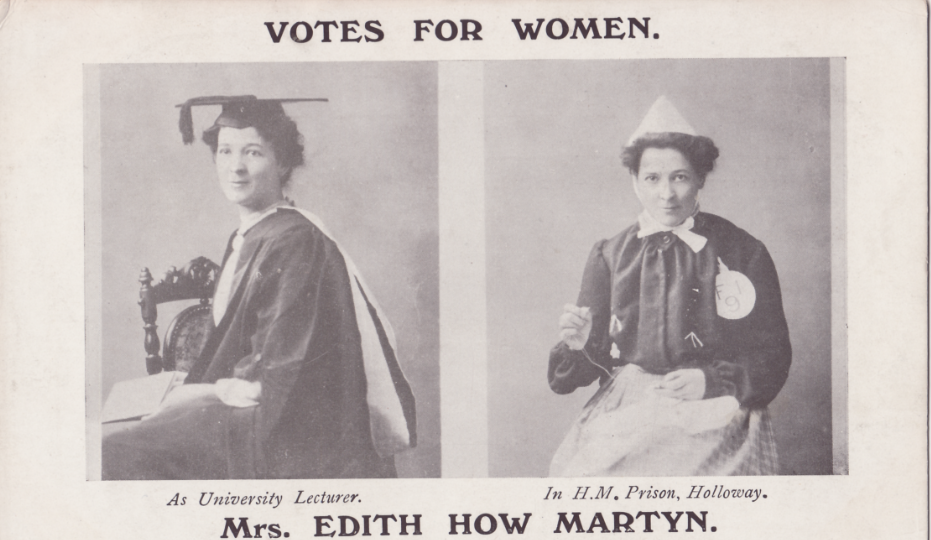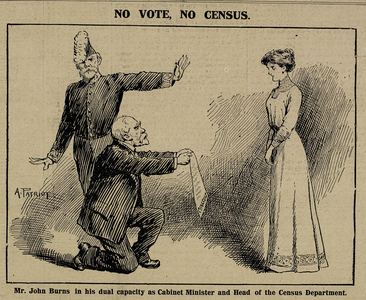“No Vote, No Census”: Pittville and Women’s Suffrage
In researching the extent and nature of support for the women’s suffrage movement in Cheltenham, primarily in the years 1900-14, I have built up a database of individuals who appear in the local and suffrage press as speakers, committee members or more radical activists. This has been augmented by census information, occasionally of a surprising nature, as in three cases in the Pittville area described below.
Although Pittville seems to have had less numerical support for the suffrage movement than (for example) Montpellier, there were nevertheless a few Pittville women who were supporters of some passion. In 1911, the more radical wings of the movement, represented by the Women’s Social and Political Union - commonly known as the suffragettes - and the Women’s Freedom League, supported a census boycott, after continued failure of the government to support a women’s suffrage bill.1 The boycott was actually initiated by the leaders of the WFL, one of whom was of Cheltenham origins – Edith How Martyn was the daughter of the wealthy grocers, How, and had worked briefly as a science teacher in Cheltenham after her marriage to George Martyn, son of H. H. Martyn.2 Her sister, Florence Earengey, was still an active women’s suffrage campaigner in the town, but on the less radical wing.

Reproduced by kind permission of Michaela Borg
Edith How Martyn’s editorial in The Vote of 11 February 1911 called on women:
‘… to boycott the census, to refuse all information about themselves and their households… We intend to do our best to make it unreliable and inaccurate.’
A propaganda war and secret planning then began. The census boycott could take the form of physically absenting oneself from home on census night, usually gathering in a secret location with fellow protesters, or refusing to complete the census schedule, or writing some defiant statement on the schedule. The Stirling family of 30 Clarence Square opted for the last of these alternatives. The head of the household was 51-year-old widow Frances Stirling, who had three daughters living with her, Elvira (24), Ethel (18) and Nina (14). Their form is filled in, but at the bottom is written: ‘This Form is Filled in through the Magnanimity of a Suffragette Hoping that a more generous & just Legislation for Women will soon be forthcoming from those in Power in Great Britain.’ Frances described her occupation as ‘Private Means. Suffragette’ (stating her employment sector as “W.S.P.U” and her status as working on her “own account”), while Elvira describes her occupation as ‘Women’s Suffrage’ (“W.S.P.U.”, and her status as “worker”). Elvira was presumably the ‘Miss Stirling’ who dressed the window of the WSPU committee room in Cheltenham in April 1911 and who therefore was a WSPU ‘worker’.

1911 England census: 30 Clarence Square, Cheltenham: form completed by Frances Stirling (RG14/15545/160)
Two other women appear to have put pressure on their husbands to omit them from the schedule, one more successfully than the other. Mrs. Amy Creese, who contributed to WSPU funds in 1911, had obviously had some debate with her husband, Alfred, a fancy draper of Atherstone Lawn (now Deerhurst, 88 Portland Street). The line of the schedule on which she should have appeared has ‘wife away’ crossed out, suggesting that they were not sure how to handle the issue: she obviously went to some ‘safe house’ with other supporters for the night. (Through checking her details from the 1901 census, it is possible to ascertain that she was not at any other location in the UK.)

1911 England census: Atherstone Lawn, Portland Street, Cheltenham: form completed by Alfred Loxley Creese (RG14/15546/183)
Mrs. Catherine McMurdo of 2 Clarence Square was listed by her husband, George, a retired civil servant, but then firmly crossed out - by whom it is impossible to say! She had also contributed to WSPU funds in 1911, so was prepared to be counted publicly as these contributions were listed in Votes for Women, the WSPU newspaper.

“No Vote, No Census”: cartoon published in
Votes for Woman (24 March 1911)
It should be noted that Mrs. Creese and Mrs. McMurdo were displaying considerable courage. Census evasion was an act of civil disobedience, with a fine of £5 and potential imprisonment for non-payment. In polite middle-class society, this would carry a stigma even in an era of increasing suffragette militancy. Even being prepared to be named as a contributor to WSPU funds in the suffrage press was a bold political statement. Three other women in Pittville were prepared to do this, though were not willing to boycott the census. These were Mrs. Mabel Earwaker of Fern Lawn, Pittville Crescent, whose husband, Robert, was a retired calico printer; Mrs. Katharine Waddy of Evesham Lodge (now 104 Evesham Road), whose husband was the general manager of a door-manufacturing company; and Miss Rolles of Walsingham (now 100), Evesham Road. Three sisters lived together there so it is unclear which of them was the WSPU supporter – all were in their late 50s and early 60s and had ‘private means’.
Another family connected with the WSPU was the Mellersh family of The Gryphons, Pittville Circus Road. William Mellersh was a solicitor, as was his son William Lock, who married Gladys Daubeny of Haddo, Pittville Circus Road, the daughter of a retired Royal Navy captain, in the spring of 1911. She very swiftly became Honorary Secretary of the Cheltenham WSPU, being named as such in early 1912, with an address in Painswick Road.
I have also managed to trace three Pittville women who were attached to the non-militant National Union of Women’s Suffrage Societies (NUWSS). This was far more acceptable in Cheltenham society than militant attachments, so it is perhaps surprising that there were apparently so few. Miss Lucy March Phillipps of 4 Wellington Square West was a very elderly supporter of over 80 when she attended the annual meeting in 1903. Her support went back to the less frenetic days of the 1870s when there was considerable Cheltenham support for women’s suffrage. Mrs. Isabel Rogers-Harrison of Kenilworth, Pittville Lawn, the wife of a retired Lieutenant-Colonel in the Indian Medical Service, is recorded as having sent her apologies for the annual Garden Party in 1905, again suggesting that she was a regular supporter, although then aged 42 she was from a younger cohort. Similarly, Mrs. Adelaide Grist of 7 Wellington Square, the wife of the managing director of a flock and mattress wool manufacturing company, was in her early 40s when she is recorded as seconding a motion at a meeting in 1910.
It must also be noted that men were also public supporters of women’s suffrage and, in Cheltenham, I have been surprised at how many of them appeared on platforms and at how many were from colonial and military backgrounds. One of these has been found in Pittville, (retired) General William Winson of Cotswold Lodge, Pittville Circus Road, who appeared on the platform of a meeting in 1901. Interestingly, his French-born wife, Hermione, does not appear to have taken such a prominent role.
The tentative suggestion above that there was relatively less support from Pittville women than from women in other areas of Cheltenham should be treated with caution. What is revealed by evidence taken from newspaper and census sources is the more public face of activism: there may well have been many Pittville women who attended meetings or who showed their allegiance to the suffrage cause in less conspicuous ways. Pittville gentility may have had hidden depths!
Sue Jones
1 For a fascinating account of the census boycott, see ‘Vanishing the Vote’ by Jill Liddington, M.U.P 2014, or her article which can be accessed at http://hwj.oxfordjournals.org/content/early/2011/02/21/hwj.dbq064.full
2 H. H. Martyn & Co was founded in London in 1888 and specialised in memorial carving. The company also had offices in Cheltenham and Birmingham. It subsequently developed as an aircraft manufacturer during WW1.
Sue would be delighted to hear from anyone with further information on the women’s suffrage movement in Cheltenham. Please contact her on sejones47@hotmail.com.
This page contains public sector information licensed under the Open Government Licence v2.0